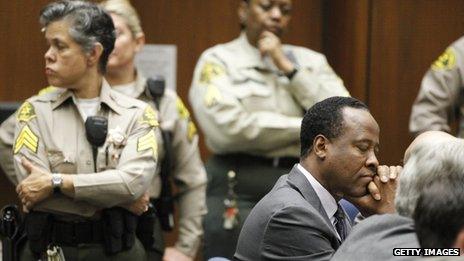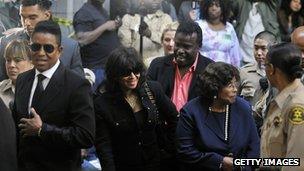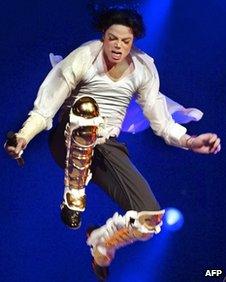Two decisions Conrad Murray may regret
- Published

Conrad Murray closes his eyes after he is sentenced
There were several things that divided them throughout their client's six-week trial.
But the issue that caused the most disagreement between the two key members of Dr Conrad Murray's legal team was the question of whether the defendant himself should testify on his own behalf.
Murray's pugnacious Texas-based lead counsel, Ed Chernoff, was adamant Murray should not take the stand.
He feared the case raised so many unanswered questions it would be "open season" for the prosecution when the time came to cross-examine the physician.
His flaxen-haired co-counsel Michael Flanagan disagreed. As the trial progressed and the evidence against Murray mounted, Mr Flanagan became convinced his client's only chance of acquittal lay in giving his own version of events.
Documentary infuriated judge
As he told the magazine Texas Lawyer shortly after Murray was convicted: "The elephant in the room was the need for the doctor to explain what he did."
It was something Murray himself had clearly been weighing up right until the very last minute.
As the defence moved to rest its case. Judge Michael Pastor reminded the doctor of his right to take the stand and asked him directly whether he wished to reconsider.
Murray looked at Mr Flanagan and Mr Chernoff in turn and then paused for what seemed like an eternity before replying, "no".
That he chose to break his silence in a documentary broadcast on the American network MSNBC just a few days after being found guilty clearly irritated Judge Pastor.
But it was the programme's contents that left the judge almost incandescent.
Far from appearing remorseful about what had happened to Michael Jackson, Murray almost seemed to regard himself as the victim, declaring defiantly: "I don't feel guilty, because I didn't do anything wrong."
Murray passed up a final chance to address the court minutes before his sentencing.
Die is cast
The judge said the documentary interview was ultimately what persuaded him against granting the accused probation, thereby paving the way to a maximum sentence of four years in prison.

Jackson's family is pushing for the astonishing sum of more than $100m
Mr Flanagan said afterwards that while the judge would have wanted to hear from Murray it was probably too late by then to affect the outcome.
"The die was cast a long time ago," said the lawyer, ruefully.
It seems unlikely that either Mr Flanagan or Mr Chernoff will be back in court for a hearing at the end of January to determine how much Murray will have to pay by way of restitution to Michael Jackson's estate.
The tension between Mr Flanagan and Mr Chernoff - which even surfaced in that controversial documentary - is one reason they are both reported to be keen to put the Conrad Murray case behind them.
Jackson's family is pushing for the astonishing sum of more than $100m (£64m).
'Entirely too little'
They say that is what he stood to make from the This Is It concerts at London's O2 arena.

Jackson had been rehearsing for a series of concerts in London
But the fact of the matter is this: Conrad Murray was heavily in debt when he went to work for Michael Jackson, and since Jackson died before he could repay those debts Mr Flanagan believes the family will be lucky to see much of it.
"Anything over a couple of dollars he is simply not going to have the ability to pay," he said.
And then there is the question of the lawyer's own remuneration. The Texas Lawyer article revealed that it had "not been equal to the task" and quoted Ed Chernoff as saying:
"If Dr Murray had paid me a quarter-of-a-million dollars it [would have been] entirely too little considering the amount of work that was involved and the collateral issues that were attached."
The only upside being that - given the high profile nature of the case - future generations of law students may well end up mulling their arguments and discussing their testimony… and wondering, perhaps, whether things might have been different had Murray taken the stand.
- Published29 November 2011
- Published11 November 2011
- Published8 November 2011